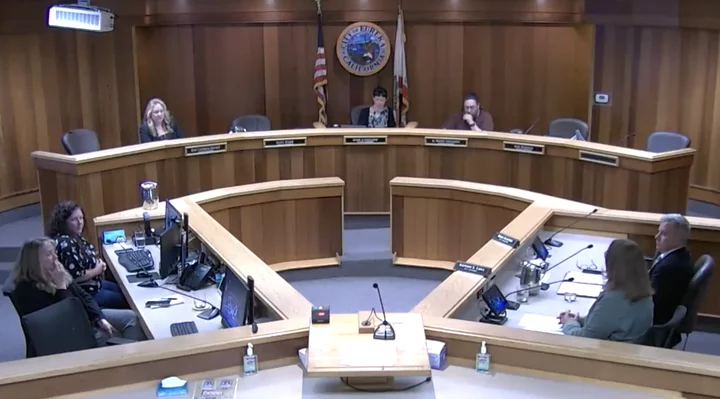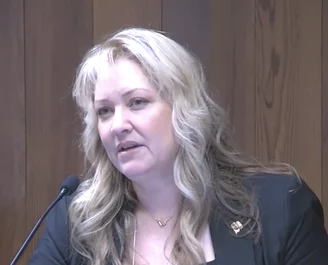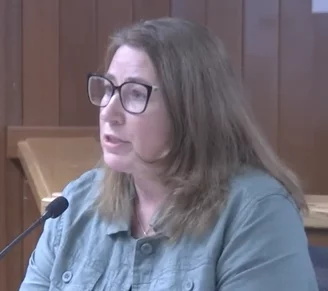Screenshot of Tuesday’s Eureka Council meeting.
###
The Eureka City Council on Tuesday took its first look at a draft ordinance that would require property owners to regularly maintain empty buildings to address and prevent blight around the city.
The Vacant Building Ordinance, if approved, would impose new rules on commercial and residential properties that have been unoccupied for more than 30 days to discourage property owners from allowing empty buildings “to remain vacant indefinitely.” Under the proposed rules, property owners would be required to “actively maintain and monitor” vacant buildings that are not “actively being offered for sale, lease, or rent.” If the building is not maintained for 30 days or more, the owner will be fined $1,000 per month.
There are a few exceptions to the proposed rules. If there is an active permit and the owner is diligently working to “complete the repair, rehabilitation, or demolition” of the building, they’re probably exempt from enforcement.
Councilmember Renee Contreras-DeLoach asked City Attorney Autumn Luna to explain what counts as regular maintenance and appropriate landscaping. “This is not HOA behavior we’re talking about, right?” she asked. “We’re not going to be out there measuring people’s lawns.”
“Absolutely not,” Luna said, adding that she would never ask the city’s code enforcement team to “go out and measure grass.” She acknowledged that people may “quibble about whether their particular lawn is a mess” but said that wasn’t a pressing issue that she was aware of.
“Not to be too punny, but I don’t want to get in the weeds on the health and safety standard issues,” Luna said, adding that such issues are already addressed in municipal code. “We’re generally talking about places that don’t necessarily look like a dilapidated mess, but they’ve been vacant for a very long time and we’re trying to reach [those] buildings with this ordinance.”
Asked how staff would sort out citizen complaints about maintenance at vacant sites, Luna said the city’s code enforcement team is trained to identify issues that rise to the level of enforcement. Regardless, property owners and neighbors have “due process” to air out their concerns. “That is baked into every law enforcement action we take,” she said.
Councilmember G. Mario Fernandez asked how the ordinance would be enforced and if the city would keep a registry of vacant buildings. Luna said the city would maintain some sort of registry “to the extent necessary to enforce this tool.” As for enforcement, the city is hoping property owners will self-report and bring themselves into compliance with the ordinance. However, most code enforcement actions are based on citizen complaints, she said.
“Code enforcement doesn’t have the time and isn’t generally roving the neighborhoods looking for problems,” Luna said. “They’re responding to concerns from the community when they go out on calls.”
Councilmember and Mayor Pro Tem Leslie Castellano, who filled in for Mayor Kim Bergel at Tuesday’s meeting, reminded the council and the audience that staff was looking for direction on the draft ordinance and a final version would come back in the next month or so.
Speaking during public comment, Scott Pesch, a local commercial real estate broker, expressed concern that the proposed rules would unfairly punish property owners for vandalism and other issues that occur at vacant properties.
“I represent a lot of clients that have commercial buildings that are vacant or are for sale,” he said. “When a vacancy [occurs] there is a kind of crisscross where the homeless are attracted to it because it is vacant and … then their trash is left behind and vandalism occurs. So, you have this crisscross where the city might look to the owner and the owner might look to the city. At the root of the problem is homelessness. Some of it, not all of it.”
Pesch also expressed concern about the proposed fee structure and how it would affect the local real estate market. “Sometimes the economics of the city don’t always warrant that you’re going to have a complete 100% occupancy. You’re going to have vacancies out there,” he said. “I think we’re all working toward the right thing, I just want to be careful with some of this language.”
Following public comment, Luna said a property owner who is struggling to find a renter could still comply with the draft ordinance.
“If your concern is penalizing folks who own a vacant building, say a commercial property owner who takes three months to rent … that’s not somebody who would necessarily be in a penalty situation,” she said. “They could still be in compliance with the ordinance. They would, however, be paying a monitoring fee. I just think it’s important to understand the difference between fee and fine in this context.”
Asked about next steps, Luna recommended that the council table the discussion for the time being to give staff time to address some of the council’s questions. DeLoach made a motion to that effect, which was seconded by Fernandez.
“I appreciate the discussion and I appreciate all the work put in by staff, but I’m not comfortable with [the ordinance] as written,” DeLoach said. “I think it can be really tricky sometimes for people to fill buildings. … That being said, I do not like that our downtown is suffering and knowing that sometimes people are just using [vacant buildings] as write-offs.”
After a bit of additional discussion, the council approved the motion in a 3-0 vote, with Councilmember Scott Bauer and Councilmember Kati Moulton absent.
###
What else happened at last night’s meeting?
- The city council also received a report from OIR Group, the city’s Independent Police Auditor (IPA) regarding the Eureka Police Department’s role in the greater law enforcement response to the recent pro-Palestine protest at Cal Poly Humboldt. OIR Group’s 26-page review offers a detailed account of the April 22 events on campus, along with a list of recommendations for the department. The report was critical of the University Police Department’s leadership in the police response but praised the EPD for being more prepared and equipped than other responding agencies. OIR Group recommended that the city “facilitate a multi-agency debrief to discuss where improvements can be made in future responses.” The council agreed to receive the report.
- Later in the meeting, Fernandez asked the council if it would be interested in reviewing the city’s existing multi-agency response guidelines to address some of the concerns brought up in OIR Group’s report. The council agreed in a 3-0 thumbs up.



CLICK TO MANAGE